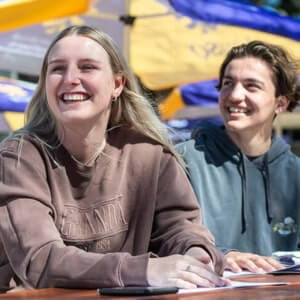- 4 years (or part-time equivalent)
- External
- Feb, Jun
- View dates
- AUD 34,280
- (Indicative annual fee)
Overview
- Become a qualified exercise physiologist and be ready to embark on a fulfilling career in health, sport and fitness with UniSQ’s Bachelor of Clinical Exercise Physiology (Honours). Accredited exercise physiologists work across many areas of clinical care, including cardiac and pulmonary rehabilitation, musculoskeletal injury management, occupational health and work injury rehabilitation, cancer care, neurological rehabilitation, metabolic disease, renal disease, and chronic, complex disease management.
- Learn to design, deliver and evaluate exercise interventions for people with medical conditions, injuries, or disabilities.
- Examine all aspects of clinical exercise physiology, including anatomy and physiology, psychology, strength and conditioning, exercise prescription, and programming and delivery, alongside 500 hours of professional placements.
- Benefit from a degree that blends academic learning through practical and theoretical expertise with a research component allowing you to refine your research skills and experience.
- Graduate as an exercise physiologist, with the ability to be accredited with Exercise and Sport Science Australia. You’ll be able to apply for a Medicare provider number and be recognised by private health funds for exercise physiology sessions.
- Benefit from UniSQ’s Exercise Physiology Clinic, a community exercise rehabilitation service providing ongoing care for patients. Gain real life experience in assessment, exercise prescription, and education for individuals and groups, as well as training in clinical software systems that are used in industry.
Right uni for me
The campus has a great vibe and felt welcoming right from the start, I instantly knew this was the right uni for me. I’ve learned from exceptional lecturers who offer ongoing support and guidance in the field.
Grace - Health
Career outcomes
- Accredited clinical exercise physiologists can find jobs within the health, exercise, sports, and fitness industries. Positions are available within private practices, general practices, hospitals, insurance companies, and community health services.
- Graduates can work with general medical practitioners to assist with patient care under general practice management plans (part of the Medicare system).
- Careers are also available in corporate health as organisations are realising the importance of employee health. Roles within this sector may include managing and rehabilitating injured staff or educating employees on safe work practices. Opportunities range from supporting baggage handlers at an airline, training hospitality staff in best health practice, or managing fatigue and physical strain of manufacturing production line employees.
- Graduating with research skills as well as clinical skills allows you to undertake roles such as interpreting health related data, policy writing within the sports industry, contributing to health papers, and working with specialised agencies, such as the World Health Organisation.
Professional accreditation
The Bachelor of Clinical Exercise Physiology (Honours) is accredited with Exercise and Sports Science Australia (ESSA) at the level of Accredited Exercise Physiologist and Accredited Exercise Scientist.
What you'll study
To graduate from the Bachelor of Clinical Exercise Physiology (Honours), you must successfully complete 32 units of study.
Degree structure
An undergraduate university degree typically consists of a combination of core, major and elective courses designed to provide you with foundational knowledge and opportunities for an in-depth deeper dive into your chosen field.
Refer to the UniSQ Handbook for detailed recommended enrolment patterns and course availability.
You may be eligible for recognition of prior learning if you have previous studies or relevant work experience. This could reduce the number of courses you need to study to complete your degree.
Degree requirements
As part of the degree, you will need to complete 500 hours of practical placements. Some placements are conducted at UniSQ Ipswich, and a portion of the placement hours will need to be undertaken in a regional, rural, or remote setting. Placements in industry provide professional experience, putting the theory into practice, and opportunities to start networking with potential employers.
All students must be able to meet the physical and other professional requirements of practical placements within this degree.
You will be required to attend on-campus residential schools as part of this degree. During these sessions, you will attend face-to-face practical classes and workshops, use the laboratory facilities and specialised equipment, and engage with staff and fellow students.
Other study options
With a focus on research within this degree, it allows for further opportunity in study, with the Doctor of Philosophy (Phd) is a viable pathway for First Class Honours graduates.
Entry requirements
You need to satisfy the following requirements to be considered for entry into this degree.
Use our International qualification converter to check country-specific grades (that are equivalent to Australian Year 12) you will need to apply for this degree.
To study this degree, we assume you have sound knowledge in:
- English (Units 3 & 4, C), or equivalent
We assume that your knowledge is equivalent to a grade C or higher in Units 3 and 4 at high school level (typically studied in Year 12). Find out more about assumed knowledge.
You'll need to meet the applicable English language requirements and this degree requires:
- IELTS (Academic) - Minimum overall score of 7.0 and a minimum score of 7.0 in each of the four components - listening, reading, writing, and speaking.
Alternative English language proficiency tests may also be accepted.
During your study
While not needed to apply, you'll need to meet these requirements throughout your studies.
All students need to provide the following documents prior to commencing any placements:
- Blue Card or Working with Children Check (if unable to obtain: Australian Police Certificate)
- first aid certificate
- cardiopulmonary resuscitation (CPR) certificate
- a signed UniSQ Student Declaration.
Most placements also require:
- National Disability Insurance Scheme (NDIS) Workers Screening Card
- Queensland Health Student Orientation Checklist
- Queensland Health Student Deed Poll
- Queensland Health iLearn Modules
- Evidence of immunity to vaccine preventable diseases, demonstrated via:
- Hepatitis B vaccination and/or seroconversion
- Measles, Mumps, Rubella, and Varicella immunisation
- Tuberculosis risk assessment
- Seasonal influenza vaccination
- COVID-19 vaccination.
Entry pathways
There is more than one way to get into university, and if you're not sure about your entry options get in touch to discuss.
Fees and scholarships
- This estimated 2026 annual fee is based on the current average rate for your first year of study (8 units per year) and does not include cost of materials such as textbooks, additional costs or the Student Services and Amenities fee.
- This is an indicative guide only and your fees will vary depending on the courses you select, with the actual rates calculated at enrolment.
- We review our fees annually and they may increase each year.
- Further details are available on the Fees website.
Additional costs
You may be required to pay the Student Services and Amenities Fee as part of your degree cost.
This degree includes an on-campus residential school component that involves travel, accommodation, and meal expenses.
Placement courses may incur some additional costs, including uniform and equipment, transport to and from venues and, in some instances, living expenses, particularly for placements in rural and remote settings
UniSQ Scholarships
We offer scholarships for academic excellence, community leadership, and financial need - you can apply for more than one!
Find out moreHow to apply
The University accepts applications all year. Complete your online application directly to UniSQ.
ApplyYou can select to start your study in Trimester 1 or 2.
| Study period | Orientation | Start date |
|---|---|---|
| Trimester 1, 2026 | Monday 9 February | Monday 16 February |
| Trimester 2, 2026 | Monday 25 May | Monday 1 June |
Preparing to apply
You've made the decision to study at UniSQ - congratulations! Take the next steps:
You can contact one of our approved agents to guide you through the application process. Our agents provide:
- advice on your study plans
- advice on applying to UniSQ
- document certification
- assistance with any pre-departure arrangements
- assistance with your visa requirements.
To support your application, you will need to submit certified copies of:
- identity documents (passport)
- evidence of your English language proficiency
- senior high school (A levels/Year 12) certificate and academic transcripts
- all post-secondary study certificates and academic transcripts (if any)
- evidence of work experience (if required).
Application dates can vary so be sure to check our key dates to get all the details.
It is important to apply early to allow enough time for your application to be assessed and processed to meet study commencement dates and participation in Orientation activities. You should also factor in visa processing requirements and timeframes, where applicable.
After you’ve submitted your application, you will be emailed a reference number. Please allow up to 14 days for assessment. If further assessment is required for course credits or exemptions, this process may take longer.
Once you have received your letter of offer from UniSQ, you will need to return your signed acceptance of offer form. The UniSQ team will contact you at this time with more information regarding next steps.
Find out more
Connect with us - start a conversation, whenever suits you.
Frequently asked questions
You may have wondered ‘What is exercise psychology?’ It is essentially about how exercise impacts our heart, muscles, breathing and our general wellbeing.
With the knowledge you'll get from a UniSQ exercise psychology degree you will be qualified to work with individuals and the community to help them achieve their goals, whether that's to become an elite athlete, gain more muscle or improve their vitality as they age.
If you're interested in the science behind how we move then UniSQ’s physiotherapy and sports science clinical exercise physiology degree is for you.
Make the practical choice for your clinical exercise physiology career when you choose UniSQ as you mix evidence-based learning with hands-on training.
- Start your exercise physiology career in only four years with UniSQ as one of the few degrees in Australia to offer such a pathway to Allied Health practice.
- Put your theory into practice with UniSQ’s Sport and Exercise Clinic, giving you the opportunity to work directly with patients in exercise rehabilitation.
- Gain the experience of assessing individuals, prescribing exercise plans, and using industry clinical exercise physiology software.
- UniSQ is rated 5/5 stars* for Health Services and Support:
- skills development
- student support
- teaching quality.
Good Universities Guide, 2025.
You'll be covering a diverse range of specialities from anatomy and physiology, psychology, strength and conditioning to exercise prescription while you study exercise physiology with UniSQ.
This means you'll be empowered to choose whichever career path you're passionate about while also meeting the accreditation requirements to practice as an exercise physiologist.
Clinical exercise physiology is a highly practical course where you'll complete 500 hours of clinical experience during your four years of study.
This includes working hands-on with individuals at our community exercise rehabilitation clinic ensuring you're ready for a thriving career upon graduation.
If you enrolled to study our exercise physiology degree externally, you will have the opportunity to come on-campus for residential schools, where you will attend face-to-face lectures and tutorials, use the facilities and network with staff and fellow students.
This will vary depending on where you choose to study your clinical exercise physiology degree, however at UniSQ you'll need to meet the minimum ATAR and assumed knowledge.
We use ‘Assumed knowledge’ to explain the minimum level of knowledge we presume you have in some subjects before you start your degree.
In addition to meeting these requirements if you have exercise physiology placements throughout your degree you will have to provide documents such as a Blue Card or Working with Children Check, first aid certificate, cardiopulmonary resuscitation (CPR) certificate and a student declaration.
Did you know you may qualify for additional points to improve your Rank? Our Adjustment Factor Pathways can increase your Selection Rank, through the allocation of points in certain circumstances, such as, where you live and the subjects you’ve passed.
For further information on ATAR and assumed knowledge and supporting information, please view the entry requirements section of this page.
Once you finish your exercise physiology degree at UniSQ you'll be equipped and in demand for a variety of career opportunities including:
- various roles within the health, exercise, sports and fitness
- working with general medical practitioners to support with patient care within the healthcare system.
- honing your knowledge in exercise physiology while working across clinical care settings such as cardiac and pulmonary rehabilitation, musculoskeletal injury management, metabolic disease or work injury rehabilitation.
- interpreting the latest health science for policy writing within the sports industry or even contribute to health papers yourself.
At UniSQ we're big believers in flexible study options for our degrees, putting the power in your hands. You can study a Bachelor of Clinical Exercise Physiology (Honours) part-time, full-time, on-campus or complete some of your subjects online.
This degree is hands-on which means you'll be required to take part in on-campus clinical experience and residential schools for many subjects throughout your studies. This is to make sure you get the most out of your learning experience.


